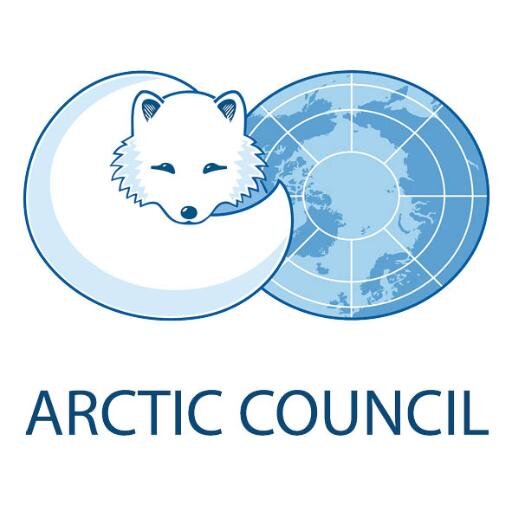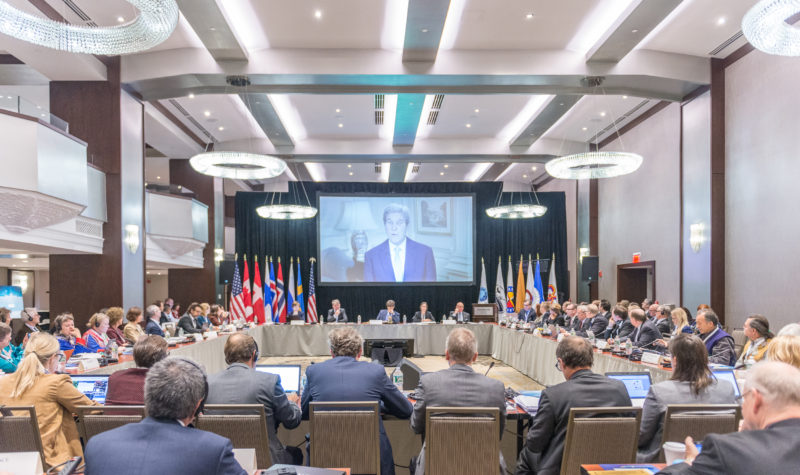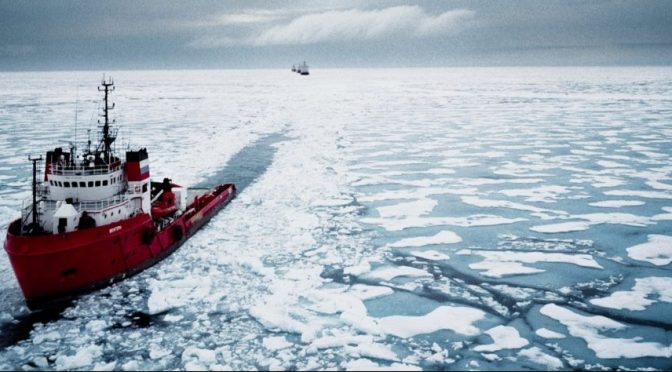From author Ian Birdwell comes The Changing Arctic, a column focusing on the unique security challenges presented by the increasingly permissive environment in the High North. The Changing Arctic examines legal precedents, rival claimants, and possible resolutions for disputes among the Arctic nations, as well as the economic implications of accessing the region’s plentiful resources.
By Ian Birdwell

Founded in 1996 as a regional forum and tool to coordinate scientific research by nations within the Arctic Circle, the Arctic Council has grown in prominence over the past six years as global temperatures have risen. The Council is looked to as a means for facilitating research of the Arctic’s changing climate, and could potentially become the forum for resolving disputes in the high north. Unfortunately, the Council’s focus is narrowly defined to scientific diplomacy and promoting unity in scientific endeavors to enhance trust between its member states. In addition, the council may only make recommendations and is not a legal body.1 With the Arctic predicted to have the lowest amount of sea ice on record2 and grim predictions for the future, it becomes important to understand the Arctic Council and the impact its focus on scientific diplomacy will have on the Arctic in two key areas: military development and trade route controls.
While the Arctic Council has brought its member states closer through cooperative research, when it comes to military matters the Council has remained almost completely silent. In practice, the Council helps to coordinate the climate research from its members and develop specific trade guidelines, though there is some appetite to extend the Council’s role into other regional concerns, such as territorial disputes.3 The warming waters are seeing an increase of military activity from every major Arctic player with Russia,4 Denmark,5 Norway,6 Canada,7 and the U.S.8 all training and equipping their militaries for Arctic action. For example, over the past few years the United States has maneuvered to increase the presence of the U.S. military above the Arctic circle, yet recently appointed Arctic Ambassador, Mark Brzezinski, remains adamant about keeping the Council free of discussions of military matters.9 The Ambassador isn’t alone; the Arctic Council has stood resolute by mandates laid out in the Ottawa Declaration of 199610 strictly prohibiting the discussion of security matters by the council. With NASA predicting 2016 to have been the hottest year on record,11 it is becoming readily apparent the climate is not the only thing changing in the Arctic and it seems scientific diplomacy may not be enough to avert the course of arctic militarization forcing each nation to seek their own route to peace in the Arctic.

One of the caveats for obtaining Observer status on the Arctic Council is acknowledging of the primacy of UNCLOS regarding territory control, though the Arctic Council seems poorly poised to assisting in developing economic policies for exclusive economic zones. The Arctic Council formed the Arctic Economic Council in 201412 to begin to address economic concerns as ice sheets retreat. Since then, the Arctic Economic Council has done little of note other than work on expanding telecommunications access to the Northern reaches of North America. In the midst of these changes, the Arctic Council is putting itself behind the curve of climate change and making it more difficult for regulations to adjust to a changing economic climate.
A shorter trade route between Europe and East Asia would be a massive boon to the states and companies willing and able to adapt to the change as quickly as possible. Several observer states on the Arctic Council sought those positions in order to be close to Arctic nations for trade considerations on a future Arctic trade hub, which has led nations like South Korea to develop the infrastructure to become a refueling point for future Arctic shipping companies.13 The Arctic Council’s scientific diplomacy makes for great short-term policy to assuage fears of a warming Arctic by studying the changing climate, yet some believe the goals to partially reverse or stabilize global warming may be for naught in an already dramatically changing Arctic.14 Thus, scientific diplomacy may make it difficult for the Council to develop a role as a forum to address or mediate the concerns of Arctic nations especially in trade, and having the Arctic Economic Council’s most recent meeting focus on telecommunications sets both institutions behind the curve.15 In the midst of this action, investors are positioning themselves to make millions via the trade routes of the Arctic Ocean regardless of which nation legally controls those routes.
Regional state relations could change dramatically as the ice melts. Such a change could prove disastrous as the most prominent organization capable of mediating in the region has focused on a scientific approach to a problem involving the fate of millions of dollars of trade and the armed forces of five nations.
Ian Birdwell holds a Bachelor’s Degree in Government and International Politics from George Mason University.
1. Arctic Council, “The Arctic Council: A backgrounder.” May 23, 2016.
2. Rosen, Yereth, “Persistent Arctic and sub-Arctic warmth expected to continue for months,” Alaska News Dispatch. May 29, 2016. <http://www.adn.com/arctic/2016/05/29/persistent-arctic-and-subarctic-warmth-expected-to-continue-for-months/>
3. Martinson, Erica, “Ambassador to the Arctic:Meet President Obama’s point man for Alaska,” Alaska News Dispatch. January 30, 2016.<http://www.adn.com/politics/article/ambassador-arctic/2016/01/31/>
4. The Arctic, “Russian Defense Ministry to complete Arctic military infrastructure by 2020,” The Arctic With Support from the Russian Geological Survey. August 18, 2016.<http://arctic.ru/infrastructure/20160818/413312.html>
5. Rahaman, Shifa “Denmark maneuvering to increase military foothold in the Arctic,” The Coppenhagen Post. June 23, 2016. <http://cphpost.dk/news/denmark-maneuvering-to-increase-military-foothold-in-the-arctic.html>
6. Nilsen, Thomas,“Norway patrolling Russia’s military activity in Arctic with new intelligence vessel,” Radio Canada International. May 24, 2016. <http://www.rcinet.ca/eye-on-the-arctic/2016/05/24/intelligence-vessel-arctic-russia-norway-military/>
7. Hinchey, Garrett “Canadian, U.S. Troops share knowledge at Arctic military operation” Canadian Broadcasting Corporation <http://www.cbc.ca/news/canada/north/how-to-land-a-hercules-operation-nunalivut-1.3530258>
8. Schehl, Matthew L. “Marines hit the Arctic for largest winter exercise since the Cold War.” Military Times. March 2, 2016. <https://www.marinecorpstimes.com/story/military/2016/03/02/marine-hit-arctic-largest-winter-exercise-since-cold-war/81161832/>
9. Martinson, Erica, “Ambassador to the Arctic:Meet President Obama’s point man for Alaska,” Alaska News Dispatch. January 30, 2016. <http://www.adn.com/politics/article/ambassador-arctic/2016/01/31/>
10. Arctic Council “The Arctic Council: A backgrounder” May 23, 2016
11. Milman, Oliver, “Nasa:Earth is warming at a pace ‘unprecedented in 1,000 years,” The Guardian. August 30, 2016. <https://www.theguardian.com/environment/2016/aug/30/nasa-climate-change-warning-earth-temperature-warming>
12. Arctic Economic Council, “Arctic Economic Council Backgrounder,” 2016 <http://arcticeconomiccouncil.com/about-us/backgrounder/>
13. Chaturvedi, Ipshita, “Arctic Opportunities” The Indian Express. August 10, 2016. <http://indianexpress.com/article/opinion/columns/arctic-region-opportunities-south-korea-india-2964498/>
14. Rosen, Yereth, “Arctic Council uses Fairbanks meeting to think about the future” Alaska News Dispatch. May 31, 2016. <http://www.adn.com/arctic/article/arctic-council-uses-fairbanks-meeting-take-long-term-view/2016/03/19/>
15. Northam, Jackie “U.S.-Russia relations are frosty but they’re toasty on the Arctic Council” National Public Radio. June 16, 2016. <http://www.npr.org/2016/06/16/482279767/u-s-russia-relations-are-frosty-but-theyre-toasty-on-the-arctic-council>
Featured Image: The view from the deck of the Nordic Odyssey (with the tugboat the Vengery in the foreground), as the ship sailed from Murmansk, in Russia, to Huanghua, in China, in July 2012. (Davide Monteleone)

